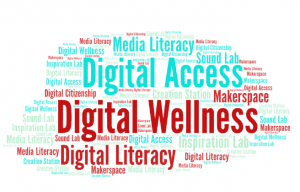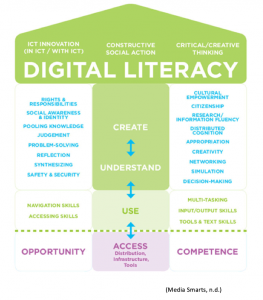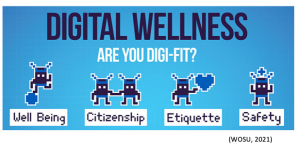
My keyword generation for my first LIBE 477 blog assignment was centered on the use of digital technologies within a school library program. I had a rough idea based on my current teaching assignment of the areas where technology integration in our library program might benefit from me investigating. I work in a secondary school part-time as a teacher-librarian/film teacher. With the current pandemic and necessity for some courses to ‘go online’ or use a hybrid learning approach, there has been an increased demand from teachers that require technology to record lesson intros, demonstrate interactive video learning tasks, etc. Our library learning commons has seen so much interest in this area that we have considered increasing our technology expenditures on portable microphones and webcams.
My initial thinking with this assignment and task was to look at how audio tools for recording and editing could be maximized beyond teacher tools but rather be incorporated to our makerspace and promoted within our library program. My initial inquiry was centered around the question – how can audio technology promote literacy? Could I create lendable kits that would facilitate producing online learning/teaching resources, podcasting, oral storytelling, video-conferencing, voiceovers, speeches or even radio plays? Better yet, could I partition some of the existing makerspace to create a controlled acoustic environment like a sound room? I still think that this is an area I’d like to investigate more, but through my inquiry, I encountered new ideas and there were a number of other keywords that generated my interest.
Keywords Generated:
- Digital Wellness
- Digital Literacy
- Media Literacy
- Inspiration lab & creation stations
- Online Library Learning Commons
- Digital Access
Most of the above keywords have some sort of crossover and all can tie directly to curriculum and a library program. What jumped out to me the most in my searches when integrating technology was the importance of promoting digital wellness.
Digital Wellness emphasizes on the following strands:
- Well-being – maintaining balance
- Digital citizenship – fostering “responsible, ethical, honest, and litera(cy) in today’s digital world.” (WOSU, 2021)
- Etiquette – promoting positive online exchange
- Safety – safe online practice and protecting what we share.
These ideas can be reinforced throughout projects utilizing technology and beyond. Our library program works hard to ensure safety and etiquette are incorporated as students navigate within the digital realm, but digital citizenship and well-being are areas that I would like to explore more.
Media Literacy: promotes critical evaluation, creation and manipulation of media. As media literacy encompasses a variety of mediums, I would like to learn more about how audio mediums can be used to promote literacy. Curricular areas such as English, Languages, Social Studies and Drama could benefit from a broader inclusion of audio mediums in the LLC as courses explore topics with spoken language, storytelling, radio plays.
Digital Literacy: “is the awareness, attitude and ability of individuals to appropriately use digital tools and facilities to identify, access, manage, integrate, evaluate, analyse and synthesize digital resources, construct new knowledge, create media expressions, and communicate with others, in the context of specific life situations, in order to enable constructive social action; and to reflect upon this process” (Martin, A., 2005, p. 135). The broad definition encompasses elements of other keywords on my list such as digital wellness as well as components of media literacy and much more.
Inspiration Lab & Creation Stations: are new terms to me that I discovered in my search about audiovisual elements within a makerspace. Vancouver Public Library offers inspiration labs “dedicated to digital creativity, collaboration and storytelling” (VPL, 2021) and I was very intrigued by their design. Our library learning commons already lends green screens out of our makerspace. We haven’t tapped into video production, as this is done through our film department. Though we are looking at acquiring more equipment facilitate videoconferencing and recording on devices, we haven’t looked at this outside of teacher use to facilitate lesson delivery. The concept of inspiration labs and creation station as part of a makerspace is something I hadn’t fully considered. Whilst the VPL model is more technologically advanced than what our school community would need, there are elements that can be drawn from this that would elevate a high school makerspace.
Online Library Learning Commons: currently our online profile is the space where students and teachers can go to find the catalogue, encyclopedias and databases. I am curious how our online presence can be broadened. From social media usage for community engagement to creating online collaborative workspaces, I feel that there is more within this topic to be explored. Could there be a landing page for podcasts for example? Our online library learning commons is very much a search, find, locate and leave space, which differs immensely from our physical space. An area that I would love to explore is bringing our online space into more alignment with our LLC philosophy that fosters community engagement.
Digital Access: ties into ideas about fostering online community engagement with our LLC. As technology expands, the ability for all members of our school community to participate digitally must lead our thinking. I included it as a keyword because the reality of expanding digital technologies might require different ways for lending and even skills-based teaching. Such as, adjusting open hours to enable access and offering overnight device lending. Further tutorial/booster sessions might need developing to ensure accessibility and ease of use for new technology to support both staff and students.
Works Cited:
Martin, A. (2005). “DigEuLit – A European Framework for Digital Literacy: A Progress Report.” Journal of E-Literacy. Vol 2.
Media Smarts. (n.d). Digital Literacy Fundamentals. Retrieved from https://mediasmarts.ca/digital-media-literacy/general-information/digital-media-literacy-fundamentals/digital-literacy-fundamentals
Vancouver Public Library. (2021) Inspiration Lab. Retrieved from https://www.vpl.ca/inspirationlab
WOSU Public Media. (2021) Digital Wellness. Retrieved from https://wosu.org/classroom/digital-wellness/


 Follow
Follow
Well done brainstorm! Your thinking out-loud demonstrates and showcases the evolutions and adaptations to our inquiry as we explore and understand more, our shift can sometimes happen subtly. Your topics and keywords are very good, but a little broad and over-arching. It might be better to pair some together, for example “Digital Wellness” with “community” or “media literacy” with “video production” as examples. These could help narrow and supply some more practical tools and approaches. Overall, good collection of search terms, key resources and demonstration of your thinking thus far.